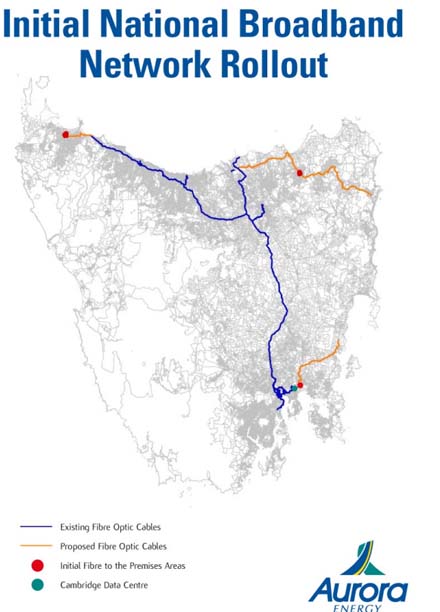Corning in cable win for $38m Tassie NBN

NBN Tasmania has awarded Corning Cable Systems its second deal to supply the state's fibre optic cable to connect around 5000 homes by mid-2010 under the $38 million initial phase of the project.
Corning, which recently launched its fibre manufacturing plant in Clayton, Victoria, has sealed its second deal with NBN Tasmania under a contract with Aurora Energy, NBN Tasmania's construction partner. Corning was also selected in October to supply backhaul cables (see image) and was the cable supplier to Tasmania's test fibre to the home network, TasColt, built by Aurora Energy in 2005.

The first leg of the roll-out.
(Credit: NBN Tasmania)
NBN Tasmania's parent, government-owned wholesale only telco, NBN Co, has also revealed via its interim website that the total cost of the initial phase of the Tasmanian project will be $38 million. The Tasmanian and Federal governments have kept quiet on the cost of the Tasmanian build; however, estimates for its total cost have ranged between $500 million to $700 million.
Minister for Communications Stephen Conroy was in Melbourne today to announce the Corning win, which will see fibre delivered to 5000 select households under Stage 1 of the roll-out. The total fibre roll-out will cover 200,000 households, while the remaining 10 per cent of the state will rely on wireless or satellite connections.
"Under this new contract, work will begin to connect the first homes and deliver services in Smithton, Scottsdale and Midway Point by mid-2010," said Conroy.
NBN Tasmania and Aurora Energy are now planning for Stage 2 of the roll-out, which will see the fibre network extended to Sorell, Deloraine, George Town, St Helens, Triabunna, Kingston Beach and South Hobart. The towns selected for early deployment are on or near the state's existing backhaul networks, currently used by government and utilities.
Andrew Connor, spokesperson for consumer action group, Digital Tasmania, said Tasmania now needs to be shown real world examples of what will be possible with such a network. "What we need now is for the government to show some real world examples such as showing an X-ray at a remote place... [In Tasmania] we can often afford the equipment, but keeping medical staff in rural areas can be difficult."
Last week Aurora Energy's general manager of strategy Martin Wallace said it would factor in rising sea levels to its construction plans.